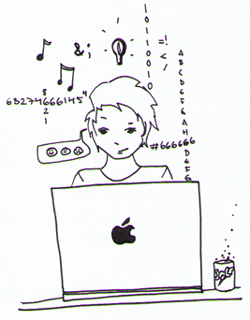This small paper begins to get at some of what I was talking about previously, though it's not in any sense complete. I'm only focusing on the family here, and even my treatment of that is quite restricted due to length limits. It's a good pre-exercise for the real thing, though. The prompt here was "What role does the
cabin play as the dominent image in Stowe's argument against slavery?"
Given the title of Harriet Beecher Stowe's classic protest against slavery, it is not surprising that Uncle Tom's cabin plays an important symbolic role in her argument. This cabin, as the center of Uncle Tom's family life, represents the most sacred and fundamental unit of human society. However, in a slave-owning society, both Uncle Tom and his home are no more than pieces of property, vulnerable at any moment to separation. According to Stowe, the social and moral ills of slavery are rooted in the destruction of the family, in robbing human beings of the capacity to create a safe and secure home.
Physically present for only a few brief pages towards the beginning of the book, the cabin nevertheless acts as the dominant image of slavery's catastrophic effect on family life, particularly in its later conspicuous absence. First presented as a neat, welcoming sanctuary of family life, with its "neat garden patch" and good food, the position of this "snug territory" is nonetheless insecure (Stowe, 32). Its status as center of life for the small community of relations and friends on the estate is legally subordinate to that of the master's "close adjoining" house (Stowe, 32). The preceding scenes in which the master and trader plan to sell Tom, the spiritual and familial head of this small community, make the reader aware that the most attentive efforts of a slave to create a happy, peaceful household are in vain if the master finds it convenient to break up this state by selling a member of the family. Tom is sold, removed from his home and family in order to satisfy the debts of a relatively decent master. He has no right to defend his home; no liberty to fight for himself and the welfare of those he loves. Not only is his lifestyle insecure, but he has no freedom to secure it.
The motif of the breaking up of familial relationships continues from the time Tom is sold to the end of the narrative. George and Eliza Harris' desperate bid to preserve their family in a free land, Topsy's lack of a good and loving upbringing, and Cassy's bitterness at having been robbed of her daughter and of the chance of a stable family demonstrate how this legal and societal lack of respect for the home of a slave plagues those who live in such a society. Thus, even in the best of circumstances where a kind master and mistress allow the foundation of such a community among the slaves, the home cannot truly flourish. The system of slavery destroys the essential characteristic of security in family life by viewing people as property, liable to be sold to satisfy a good master's debts or a bad master's whims. As another decent slave owner, Augustine St. Clare puts it, the heart of the evil of slavery does not lie in its "abuses": "the thing itself is the essence of all abuse" (Stowe, 262).
During Tom's absence, his cabin is "shut up" (Stowe, 301). He is robbed of it and it is robbed of him. Not until the very end is this break in some sense healed. George Shelby—himself a former honorary member of Uncle Tom's family, though the master's son—frees the slaves and removes this insecurity from them "in case of [his] getting in debt or dying" (Stowe, 509). The cruel fate of Uncle Tom had caused Shelby to resolve "that nobody, through me, should ever run the risk of being parted from home and friends, and dying on a lonely plantation" (Stowe, 509). His final exhortaion to his former servants serves as an exhortation to Stowe's readers as well. "Think of your freedom," he says, "every time you see Uncle Tom's cabin"; this simple house will be a reminder of the evils of slavery that tear apart the family and uproot a loving household (Stowe, 509).
